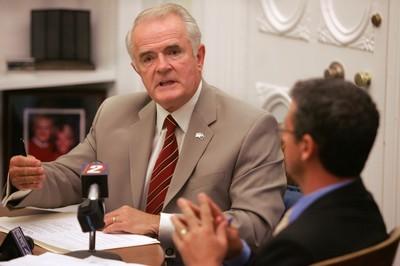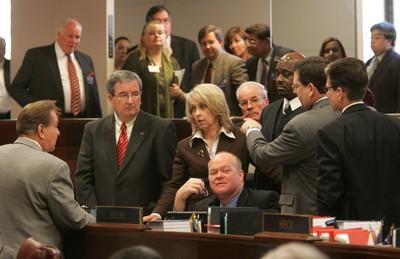Governor repeats budget veto threat


CARSON CITY — Gov. Jim Gibbons reiterated publicly Wednesday that he will veto a nearly $7 billion budget passed by the Legislature if it does not include what he called modest proposals to maintain lower taxes, pay for empowerment schools and improve homeland security.
At a media briefing in his capitol office, Gibbons made clear that he wants to negotiate with lawmakers to ensure his requests are included in the budget. He said he does not want a budget impasse to reach the point where a veto is necessary.
But he said Democrats have refused to accept his proposals amounting only to a few million dollars, which he highlighted in his State of the State speech in January.
"We have tried to talk to the Assembly; we have sent our staff over there time and time again with our priorities, our concerns, what we think is important," he said. "I was told by the speaker that some of these budgets were closed and it’s too late and nothing could be done."
Gibbons advised Republican lawmakers Tuesday of his budget priorities.
Gibbons’ four priorities are the following:
• Keeping the modified business tax rate, which is set to rise back to 0.65 percent, at 0.63 percent.
• Spending $15 million on his empowerment schools plan.
• Spending $1.7 million on a National Guard program to help high school dropouts earn their GEDs.
• Funding a homeland security program in Carson City, called a state fusion hub, at a cost of $651,000.
Gibbons said that he has made several compromises on the budget and that the four items are not negotiable.
"I actually want all of them," he said. "I don’t know how I would stand before the people of Nevada and tell them that homeland security is not important to them. To me, these are very small requests in the big scheme of a $7 billion budget."
The veto threat was not warmly received 100 yards south, in the Legislative Building.
Assembly Minority Leader Garn Mabey, R-Las Vegas, said a possibility exists that legislators in both houses, including Republicans, would override a Gibbons veto of the state budget.
"That is a possibility," he said. "If we don’t compromise, there is no end (to the Legislature). I wish this would have happened six weeks ago, so we could have gotten more sense of where the governor stood."
Assembly Speaker Barbara Buckley, D-Las Vegas, said that contrary to what Gibbons told the media, the first time the governor came to see her at the Legislature was on Monday.
"Where was his staff two months ago?" she said. "Early communication is always good. Name-calling is not good. Waiting until the last minute is not good."
Legislative leaders will look at the governor’s four must-pass proposals, Buckley said, but first they must compromise on the differences in the Senate and Assembly proposals on public education.
She noted Gibbons was author of the Education First constitutional amendment, which requires legislators to approve public education funding before other parts of the budget.
"Education First should be more than a catchy slogan," she said. "It should mean we add to the education budget in ways designed to improve student performance."
Democrats want more money placed in full-day kindergarten, career and technical education, teacher pay and an innovation-in-education fund, she said.
She declined to reveal how much additional money Democrats want to spend on public education.
Buckley said that the Senate and Assembly are close to an agreement on the spending and that she wants to wait for the resolution before giving details.
Senate Minority Leader Dina Titus, D-Las Vegas, expressed disgust with Gibbons’ veto threat.
"He says he is the Education First governor, but this is about protecting the business community," she said. "It is not Education First, it is business first."
Gibbons’ four must-pass priorities show he is out of touch with the thinking of most Nevadans, Titus added. Citizens do not want tax breaks for business and want more spent on public education, she said.
Mabey said Gibbons needs to sit down with Buckley and Senate Majority Leader Bill Raggio, R-Reno, and reach an agreement on all parts of the budget.
"I feel comfortable that I can vote for whatever they work out," he said. "I think the governor has good points and the speaker’s plan for more full-day kindergarten is good and the majority leader’s plan for empowerment schools is good. There has to be a compromise."
Gibbons said he doubts the Legislature will be able to adjourn on time by June 4 because of budget differences between the Republican-controlled Senate and the Democratic-controlled Assembly. Democrats and Republicans have failed to reach agreement on public education funding.
Gibbons announced some concessions at the briefing.
He had wanted the modified business tax, now at 0.63 percent but set to return to 0.65 percent on July 1, to be reduced further, to 0.62 percent. Gibbons also wanted to repeal a bank branch excise fee.
But Gibbons said he would agree to keep the business tax at the 0.63 percent rate, backing off his call for a business tax reduction and the elimination of the bank fee.
That would mean about $16 million in additional revenue, most of which the governor said he wants funneled into his empowerment schools program.
Gibbons originally proposed spending $60 million for empowerment schools by using existing money that provides retirement credits to teachers in hard-to-fill subject areas or who teach at at-risk schools. When school officials objected, Gibbons backed off.
Gibbons said he has been told that some lawmakers want the modified business tax to revert to the 0.65 percent, with the additional revenue being used on other programs, primarily education.
"But I will not accept a tax increase," he said. "This governor made a promise that I would not raise taxes on the people of the state of Nevada, and I plan to keep that promise."
The budget is being changed in ways that are unacceptable, the governor said. Democrats are looking for areas in the budget to save money that can be put into an expansion of all-day kindergarten, a proposal many Republicans oppose.
"We’re seeing more and more of the revenues that are needed to run the state being siphoned off and changed into programs that quite honestly the taxpayers aren’t going to be able to afford down the road," he said.
Gibbons said the fusion hub is important to the state. The request would provide a handful of positions to staff the hub, which would collect security information from Las Vegas and Reno and distribute it to law enforcement statewide to ensure a sharing of information.
The hub would ensure two-way communication that does not exist now, he said.
"I do not want to stand here and tell the people of Nevada that we didn’t do everything we possibly could to ensure their security and their safety," he said.
But Buckley and Titus both said law enforcement officials from Las Vegas and Reno testified against the fusion center.
Titus added that both U.S. Senate Majority Leader Harry Reid, D-Nev., and Sen. John Ensign, R-Nev., said no federal money will be coming to help pay for it.
Gov. Kenny Guinn threatened in 2005 to veto the budget if lawmakers did not agree to a $300 million rebate to taxpayers. The rebate was approved.
Democrats want to add more money to the public education budget and have said that Gibbons’ budget contains only $13 million for "new" programs.
That figure does not include the millions of dollars for salary increases for teachers and other education personnel.
Gibbons has proposed a cost-of-living raise of 2 percent in the first year and a cost-of-living raise of 4 percent in the second year for teachers and state employees at a cost of $183.5 million.
2007 Nevada Legislature











